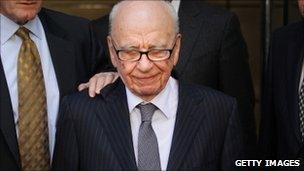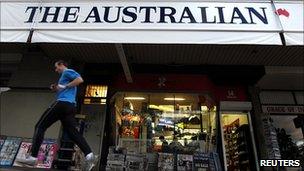Murdoch in Australia: The fallout
- Published
- comments

Rupert Murdoch has wielded enormous influence in Australia for decades
The Britain I left late on Saturday night was a markedly different place from the country that I arrived in just 10 days earlier.
Outside of a general election, it is hard to think of a moment in modern times when so much power shifted in so short a space of time.
The influence of Rupert Murdoch has been drastically curtailed. David Cameron has also been weakened. British parliamentarians, hitherto afraid to speak out against the Murdoch empire, have been massively emboldened. For long-standing critics of the Australian-born media baron, the tumble of events has had something of a revolutionary air.
So what has been the fallout in the land of his birth?
Before going on, I should say, in the interests of full disclosure, that I have written for a number of Murdoch publications, namely the Australian, the Australian Literary Review and most recently The Wall Street Journal Asia. Promiscuous on this front, I have also written for a number of their rivals.
Another important point to make is that the Australian newspaper market is different to the British one. First off, News Limited, the Australian arm of News Corporation, controls a much higher share - Murdoch-owned titles account for some 70% of the market. Largely because News Limited owns most of the tabloid titles, the competition for stories and gossip is nowhere near as cut-throat or intense. There is not a national tabloid here, and most of the papers are city-based.
The tabloid agenda is also different. There is not the same preoccupation with sex scandals and nowhere near the same salaciousness. Similarly, the flesh quotient is very small. Neither is there a tradition of entrapment. Journalists do not look so hard for skeletons in the cupboard, and even when they find them they often keep them hidden from view.
VIP credentials
On the ethical front, many of the tabloid excesses in Australia are to be found not in print but on television. Shows like A Current Affair on Channel Nine and Today Tonight on Channel Seven are serial offenders on ABC's weekly Media Watch show.

The Australian arguably wields more editorial clout than any other newspaper in the country
The main criticism of the Murdoch-owned tabloids, which comes mainly from the left, is not ethical but editorial: that they whip up populist fury on issues like asylum seekers and immigration.
"Invasion," screamed the headline of the Sydney Daily Telegraph in 2009 at the arrival of another shanty boat from Indonesia, which is arrant nonsense. More recently, the government and the Greens have been critical of the Murdoch stable of tabloids for being so vociferous in their opposition to the carbon tax.
The same criticism has been levelled against the Australian, the only national broadsheet, which has also editorialised strongly against the National Broadband Network, the Gillard government's other big-ticket issue. Arguably, the Australian wields more editorial clout than any other newspaper, partly because it is so widely read by politicians and policy makers but, most obviously, because it is owned by Rupert Murdoch, by far the country's most powerful mogul.
As in Britain, Australian politicians have tried assiduously to court him, knowing that he switches sides and tends to back winners. No prime ministerial visit to America, for instance, is truly complete unless it involves a meeting with Rupert Murdoch.
When it comes to the international VIP circuit for Australian leaders, he is up there with the US president, the Queen and the Pope. Watching the body language at these encounters is especially telling, for the politicians usually come across as supplicants. After all, prime ministers come and go, Rupert Murdoch has wielded enormous influence here for decades.
Power and responsibility
From a political perspective, his main effect, perhaps, has been to make politicians on the left more publicly conservative, which is also true of Westminster.
Ambitious types, like Kevin Rudd, have also worked hard to win over senior editors and executives. When Kevin Rudd admitted to public drunkenness at a strip club in New York - which was probably the first time most people around the world first got to hear about him - he was in the company of Col Allan, the Australian editor of the Murdoch-owned New York Post. When Julia Gillard made her first policy announcement as prime minister, ditching Kevin Rudd's Big Australia policy, she did so through the front pages of the Murdoch-owned tabloids.
As in Britain, the nexus between the major parties and the Murdoch empire is strong, multi-layered and incestuous. Tellingly, the man whom Rupert Murdoch selected to replace Rebekah Brooks as the chief executive of News International in London was Tom Mockridge, a former press adviser to Paul Keating. (As an historical aside, the changes in media ownership rules that enabled Rupert Murdoch to build up his share of the Australian market came into effect under Paul Keating).
There are already signs that Australian politicians have been emboldened by the events half a world away in Westminster and Wapping. Julia Gillard has said she is open to the idea of an inquiry into media ethics and ownership, though noticeably she hedged and did not go as far as to announce one.
"I think we will have a long debate about media ethics in this country," she told the National Press Club last week, "but if I could put it as clearly I can, I'd say to you don't write crap."
Stephen Conroy, the communications minister, openly accused the Sydney Daily Telegraph of trying to force an early election and to bring down Gillard's minority government (although his accusations that the Telegraph favour regime change pre-date the present crisis).
As for News Limited itself, it has condemned phone hacking and is now conducting an internal audit of payments over the past three years to ensure all of them were legitimate. John Hartigan, the company's chairman and chief executive, says he does not expect to find any evidence of wrong-doing and has said the culture in the company's Australian newsroom is very different from that at the News of the World.
"I know the newsrooms, I know how cultures develop and I'm hugely confident that there is no improper or unethical behaviour in our newsrooms," he told ABC last week.
Traditionally in Australia, media moguls have financed some of the country's best journalism, often at a loss. The much-missed weekly news magazine the Bulletin - a kind of Australian Newsweek - did not survive many years beyond the death of its long-time owner Kerry Packer. Similarly, the golden era of Sixty Minutes on Channel Nine came under Packer. Some of the best coverage of indigenous affairs, to use that unlovely phrase, is to been found in the pages of the Australian, and the paper made much of the running during the wrongful detention of the Indian doctor, Muhamed Hanif. Clive James has said that when Rupert Murdoch arrives at the pearly gates he will come brandishing a copy of the Australian Literary Review.
But it is not journalistic benevolence that has driven Rupert Murdoch, any more than it motivated Kerry Packer. Their investment in newspapers and media outlets brought enormous sway in Canberra, and power well beyond it. So a question: is Rupert Murdoch's Australian influence finally on the wane?